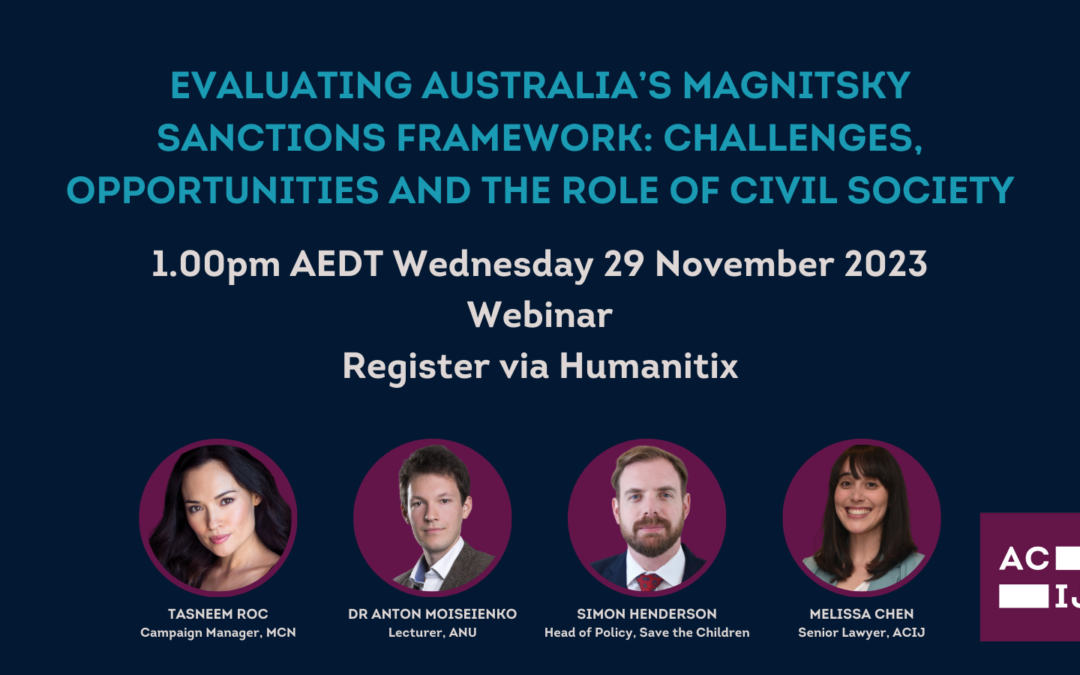Webinar Re-Cap – Evaluating Australia’s Magnitsky Sanctions Framework: Challenges, Opportunities and the Role of Civil Society – Wednesday 29 November 2023
On 29 November 2023, ACIJ hosted a webinar titled ‘Evaluating Australia’s Magnitsky Sanctions Framework: Challenges, Opportunities and the Role of Civil Society’. The webinar brought together a panel of experts – Tasneem Roc, Campaign Manager at the Myanmar Campaign Network; Dr Anton Moiseienko, Lecturer in Law at the Australian National University; Simon Henderson, Head of Policy at Save the Children Australia; and Melissa Chen, Senior Lawyer at the Australian Centre for International Justice – to discuss the challenges and opportunities of Australia’s Magnitsky sanctions framework, and reflected upon the role that civil society may have in influencing aspects of the framework.
This event was held as part of “Magnitsky Month”. Magnitsky Month honours the legacy of Sergei Magnitsky, who was killed in a Russian prison in November 2009 after exposing corruption by government officials. The month coincides with the anniversary of his death and precedes the annual International Anti-Corruption Day and Human Rights Day (December 9 and 10), when new Magnitsky-style sanctions are sometimes announced. Organisations working in the targeted human rights and anti-corruption space use this time to advocate for the expanded and improved multilateral use of Magnitsky-style sanctions around the world.
Note that the start of the webinar, with introductory remarks from ACIJ’s Senior Lawyer Melissa Chen, is not contained in the YouTube video, and instead is extracted below:
In December 2021, following a parliamentary inquiry, Australia adopted legislation allowing for Magnitsky-style sanctions, through amendments to the Autonomous Sanctions Act and the Autonomous Sanctions Regulations. The effect of these amendments is that the Minister for Foreign Affairs can impose sanctions – asset freezes and travel bans – on persons who have engaged in, been responsible for or complicit in serious violations or abuses of human rights or serious corruption, that is, bribery or misappropriation of property. It is a criminal offence to deal with the assets of a sanctioned person or entity or to make assets available to a sanctioned person or entity.
Civil society organisations, whose advocacy contributed to the adoption of the Magnitsky-legislation in Australia, hoped that these targeted human rights and corruption sanctions would provide an important accountability tool directed at those most responsible for serious human rights violations and corruption. In Australia, targeted human rights sanctions have been imposed on numerous individuals and entities from Russia and Iran, while some sanctions have been imposed on individuals and entities in Myanmar under what is known as the ‘country-specific’ sanctions framework. Calls from diaspora communities and civil society organisations for Australia to impose sanctions on individuals and entities, responsible for serious human rights violations or serious corruption in other countries, have gone unheeded. Guidance from DFAT about human rights and corruption sanctions, which civil society organisations had been calling for consistently since the legislation came into effect, was finally released a couple of weeks ago. While it does provide some helpful guidance, such as the policy considerations relevant to the Minister’s decision making and a dedicated email address for the submission of sanction designation recommendations, it is relatively brief and lacking in detail. Furthermore, the Autonomous Sanctions Regulations are currently under review, ahead of their sunsetting in 2024, with many hoping that changes will be made to better respond to the needs of organisations operating in areas subject to sanctions in response to a humanitarian crisis.
Almost two years after the adoption of the Magnitsky legislation, it is an opportune time to reflect on the operation of Australia’s Magnitsky sanctions framework, and whether it can live up to the ambitions of being a substantive human rights accountability mechanism, or just another opaque foreign policy tool with limited impact.
With this in mind we are so fortunate to be joined today by three experts to discuss these questions and more – Tasneem Roc, Campaign Manager at the Myanmar Campaign Network, an Australian national coalition formed following the 2021 coup in Myanmar; Simon Henderson, Head of Policy at Save the Children Australian who is an international human rights lawyer, academic and foreign policy analyst, with extensive experience in policy and advocacy in Australia and in the Indo-Pacific, including longstanding expertise working on sanctions and the establishment of the Magnitsky laws in Australia; and Dr Anton Moiseienko, Lecturer in Law at the Australian National University, whose work focuses on transnational crime, economic crime and cybercrime, as well as legal and policy aspects of targeted sanctions.
I am going to ask the panellists a number of questions – there will also be time for Q+A at the end, so please feel free to pop your questions in the chat including who your question is directed to. Turning first to Tasneem. Tasneem, as Campaign Manager for the Myanmar Campaign Network, you have led efforts to urge the Aus govt to impose sanctions on individuals and entities responsible for serious human rights violations and atrocity crimes in Myanmar. Would you be able to speak about MCN’s experience in advocating for sanctions and what value you think that civil society brings to the table?
